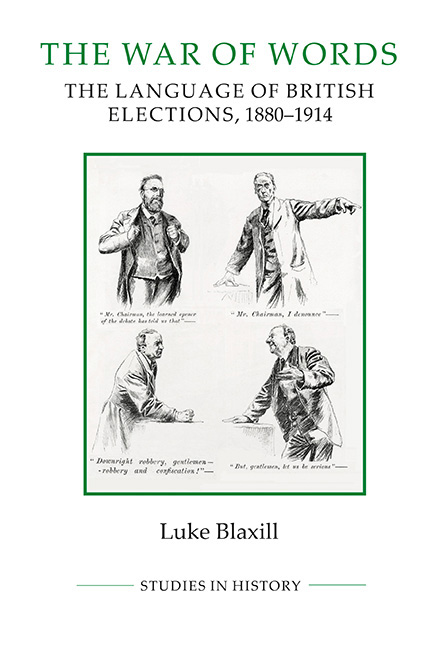Book contents
- Frontmatter
- Contents
- List of figures
- Acknowledgements
- Abbreviations
- Technical glossary
- Introduction : the challenge of reintegration in political history
- 1 On method : text-mining, corpora and the historical study of language
- 2 The impact of reform : the general elections of 1880 and 1885
- 3 The impact of home rule : the general elections of 1886 and 1892
- 4 The impact of imperialism : the general elections of 1895 and 1900
- 5 The impact of New Liberalism : the general elections of 1906 and 19101
- Conclusion: who won the war of words?
- Appendix 1 Technical and methodological
- Appendix 2 Statistical
- Bibliography
- Index
Conclusion: who won the war of words?
Published online by Cambridge University Press: 26 April 2020
- Frontmatter
- Contents
- List of figures
- Acknowledgements
- Abbreviations
- Technical glossary
- Introduction : the challenge of reintegration in political history
- 1 On method : text-mining, corpora and the historical study of language
- 2 The impact of reform : the general elections of 1880 and 1885
- 3 The impact of home rule : the general elections of 1886 and 1892
- 4 The impact of imperialism : the general elections of 1895 and 1900
- 5 The impact of New Liberalism : the general elections of 1906 and 19101
- Conclusion: who won the war of words?
- Appendix 1 Technical and methodological
- Appendix 2 Statistical
- Bibliography
- Index
Summary
British general election campaigns represent a vast discourse of billions of spoken and written words which we cannot hope to fully understand. Even this study – which has analysed nine of them using corpora totalling around four million words – has been limited to illuminating what are still relatively small clearings in a huge textual forest. Its principal claim is not so much that it has been able to analyse more political language than traditional qualitative studies (although that is almost certainly so) but that it has done so more systematically, empirically and quantitatively through a hybrid methodology which utilises distant and close readings in tandem. This methodology has been used to revisit, reassess and in many cases revise current understanding of various political controversies – from the impact of the Unauthorised Programme in 1885, Home Rule in 1886 and 1892, the Boer War in 1900, to the New Liberalism and tariff reform of the Edwardian period. However, a deeper question still remains: namely, what has been learned about the fundamental nature of the language of election campaigns, and the rhetoric of the parties who fought them?
Two key characteristics of the language of electoral politics have repeatedly manifested themselves throughout this book. The first is the elasticity and ephemerality of platform speeches. An issue which could dominate one election might be confined to the periphery – or dropped altogether – in the next. Such was the case with Home Rule, which dominated in 1886, was important in 1892, was somewhat marginalised in 1895 and dropped almost entirely in 1900. Imperialism, too, rose to prominence in 1900 not from a previous high watermark in 1895, but from its lowest discursive visibility in the period. The House of Lords was almost ignored on national and grassroots platforms until it was placed on the agenda in 1895 and (especially) 1910. Old age pensions were important in 1900, disappeared in 1906 and then re-emerged emphatically in January 1910. The dramatis personae of politics generally came and went just as quickly. Chamberlain achieved 210 mentions between both parties (in all three corpora) in 1885 but was reduced to just fiftyeight in 1892.
- Type
- Chapter
- Information
- The War of WordsThe Language of British Elections, 1880–1914, pp. 229 - 240Publisher: Boydell & BrewerPrint publication year: 2020



